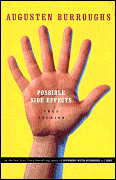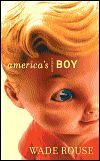 It’s been awhile since I’ve written about the books I’ve been reading. I finally finished “Possible Side Effects” by Augusten Burroughs last week and thought it was time for an update. I’ve read all his books and enjoy his style of writing. I really enjoyed “Running with Scissors” and “Dry.” Both were amazing memoirs that were fun to follow. The movie version of Running With Scissors is coming out this fall and I can’t wait to see it.
It’s been awhile since I’ve written about the books I’ve been reading. I finally finished “Possible Side Effects” by Augusten Burroughs last week and thought it was time for an update. I’ve read all his books and enjoy his style of writing. I really enjoyed “Running with Scissors” and “Dry.” Both were amazing memoirs that were fun to follow. The movie version of Running With Scissors is coming out this fall and I can’t wait to see it.
Burroughs last two books, “Magical Thinking” and “Possible Side Effects” are both collections of essays about his life at different points. While I do enjoy all the stories, I prefer his book length stories like “Running With Scissors” and “Dry.” I hope that he will be coming out with a book length story in the near future.
 The next book I’ve decided to read it “America’s Boy” by Wade Rouse. I selected this book because I saw it mentioned on Towleroad awhile ago but I can’t remember when it was. It was also a selection in my Gay Book of the Month club.
The next book I’ve decided to read it “America’s Boy” by Wade Rouse. I selected this book because I saw it mentioned on Towleroad awhile ago but I can’t remember when it was. It was also a selection in my Gay Book of the Month club.
Here’s what the publishers say:
The tacky environs of the Missouri Ozarks in the 1970s set in relief a budding gay sensibility in this funny, affecting, overripe memoir. Wearing his mother’s bikini and pearls to a mock beauty pageant at age five, winning office in his high school’s Future Homemakers club, feigning romantic interest in a string of female beards, Rouse was hopelessly out of step with the redneck masculinity urged on him by taunting classmates and despairing relatives. Fortunately, he had a charmingly offbeat family, led by two warmhearted grandmothers, who accepted him as he was (without asking too many questions) and left him with a trove of glowing memories. The plight of a queer soul fighting for life in rural America is familiar literary terrain, and Rouse renders it as a duel between flamboyant camp and white-trash kitsch. He amplifies his inner turmoil with a weepy confessional tone, obsessing about his compulsive overeating, body issues, hair issues and gross bathroom issues, and sobbing endlessly over emotional travails. In the end, the narrative lapses into a clichéd coming-out melodrama. But when Rouse looks away from the mirror to the people around him, the book comes alive with tender portraits of kitsch and kin.
Sounds like a book I’ll enjoy. Of course I’ll write something about it when I finish it.